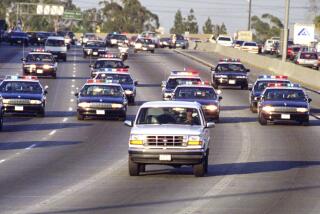Fatal advice to The Enforcer, ‘Dont take any firearms’
Jerry Wooters’ wife assumed they were going out with another policeman when he told her they were having dinner with a friend. But their companion was Jack Whalen, who brought along his society wife, Kay.
Then Jean Wooters figured that Whalen was an actor, because he spoke of breaking into TV westerns, how they needed cowboys who knew how to ride. He was suavely good-looking too, with thick, black hair, a Robert Mitchum type, only bigger. To top it off, he’d been a flyboy in the war, the dashing pilot of a B-25.
“Had a great old time,” Wooters said of the night out, though he had some explaining to do when his wife saw a picture in the paper.
“She said, ‘Is this the guy we had dinner with?’ ”
“I said, ‘You can’t believe all that stuff.’ ”
That stuff was a report in November 1958 that their dinner mate had been picked up for strong-arming a man he’d promised to set up as a bookie. The neophyte did not realize that some bets sent his way were on horse races that had just been completed, classic past-posting. At the end of his first day as a bookie, the guy owed $4,000, and it was pay up, or else -- or else he’d be another poor soul knocked unconscious by Jack “the Enforcer” Whalen.
Whalen was the most fearsome of the figures who had tried to move in on L.A.’s rackets while Mickey Cohen was off at prison. Some on the Gangster Squad liked to say there were now three gangs in town: the Italians led by Jack Dragna and then Nick Licata, the Jews led by Mickey, and the one-man Irish gang who took bets himself, collected debts for others and shook down anyone he could. Some cops even admired Whalen’s nerve in defying the mob factions and how he usually did it without a gun, thinking himself so tough he didn’t need one.
Whalen had another distinction in a city whose leaders for generations had depicted organized crime as the doing of evil outsiders. He was homegrown, the offspring of “Freddie the Thief,” the city’s most enduring con man of the 20th century.
b
A pool prodigy who was giving trick-shot exhibitions by the age of 12, Fred Whalen hustled his way west from St. Louis in 1922 and made his fortune in L.A. by having the speediest rumrunning boat off the coast during Prohibition. Then came his truly brilliant stroke -- he’d go around to hospitals posing as a doctor and pass the word that he liked to bet on the ponies and would be happy to help local bookies collect bets from others at the hospital. That was the opening move in an elaborate sting in which he bilked bookies who never suspected how confederates slipped him names of winning horses.
“Daddy didn’t get above the fifth grade, but he didn’t need it,” his daughter said.
Freddie the Thief wanted better for his son, though. He enrolled Jack in Black-Foxe Military Institute, where the boy became a “commander” while excelling at polo. Polo. Jack could have gone straight too, after piloting bombers in the war and marrying into one of L.A.’s oldest families, the Sabichis, who had a 27-room mansion on South Figueroa. His wife, Katherine, had earned acting credits in several films and Jack was going to make a living off the movies, if not by acting then by piloting crews or training their horses.
Who knows why anyone takes the path of self-destruction? By the mid-1950s, Jack Whalen had a string of arrests and an alias -- Jack O’Hara -- in addition to his intimidating nickname. He’d also picked up a piece of wisdom from his father -- if you’re gonna take that path, have a friend in law enforcement.
Yes, that helped. Like when he was out on bail, and lying low, because of the strong-arming arrest. Whalen heard that a giant Mexican was going around South L.A. pretending to be “Jack the Enforcer” and demanding protection money. Any other time, he would have taken care of the impostor personally. This time he called his man on the Gangster Squad.
“So I went by myself down there,” Wooters said, leaving it vague how he handled the imposing Mexican, other than to say that usually, if they know you’re a cop, “all you got to do is show your face.”
Wooters would argue that his deal with Whalen was no different from any cop’s with an informant -- it was one bad guy pointing you to others, like to bookies in league with Mickey. But the bottom line was that people who didn’t play ball with Whalen were liable to have the law on their tail.
“What he didn’t get a piece of, I got word of” was how Wooters described their arrangement. “I never discussed the Whalen thing with too many people.”
b
In the fall of 1959, Whalen offered him a gift -- “I got a dog for you,” Whalen said. That was one thing he had in common with Mickey Cohen. Mickey was a boxer and bulldog man. Whalen was into purebred German Shepherds and Great Danes. But Wooters wanted nothing to do with a pooch. He said he told Whalen, “They die on you, then you’re miserable.”
“No, no, you’ll like this dog.”
“I said, ‘No, no, Jack, I don’t want the dog.’
“So he says, ‘I’m telling ya, please take the dog.’ He said, ‘You’re gonna open up that garage some night and you’re gonna get your ass blasted off.’ He said, ‘You’re hurting the wrong people.’ ”
“I didn’t realize I was hurting that many people. I didn’t think I was scratching the surface,” Wooters said, but his gangster pal went on about how the animal would sniff out intruders before they planted a bomb under his car or blasted away with their shotguns or . . .
“I said, ‘Where do I pick up the dog?’ ”
The Wooters’ new pet was named Thor, after the Norse god of thunder.
b
Wooters’ sons were learning how to ride the dog around their yard in Arcadia when Capt. James Hamilton told him he was out of the squad. He was being transferred to the city jail in Lincoln Heights, back in uniform on the 4 p.m.-to-midnight shift.
“I said, ‘Well, you know, I put in a lot of years. What the hell is going on?’
“He said ‘The transfer’s effective tomorrow.’ ”
Wooters swore he never got an explanation. But several squad members knew what had been the last straw: An officer who was newer to the unit suddenly asked to leave it after working on a Wilshire Boulevard bookie. Word reached Sgt. Con Keeler, the veteran bug man, that Wooters had made the officer an unnerving proposal -- supposedly suggesting that the fellow dish him enough evidence to arrest the bookie, after which he’d offer the bookie a way out. It smelled like a shakedown to Keeler, who insisted they tell Capt. Hamilton.
“He said, ‘Who’s the guy?’ ” Keeler recalled. “I said, ‘Wooters.’
“Cap’ looked at me, just kind of shook his head.”
b
Wooters was a couple of months into his exile when he got a call from a familiar voice. Whalen was still out on bail, but not lying low any longer. It was Wednesday, Dec. 2, 1959.
“He says, ‘Ah, I got a real rough beef, can you give me a hand?’
“I said, ‘What?’
“ ‘Well, I got a showdown with that goddamned Mickey.’
“I said, ‘Where?’
“Rondelli’s.”
“I said, ‘Jack, I’m in uniform. I’m active duty. I can’t just walk out and wind up in the Valley. . . . But I’ll see if I can get you some help.’ ”
Wooters phoned his old squad. “I called and said, ‘Listen if you . . . go by Rondelli’s tonight at around 11 o’clock, I think you’re gonna find Whalen and Mickey and some others.’ And I said, ‘I’m pretty sure you’ll find some firearms.’ Then I called Whalen. . . . ‘Don’t take any firearms.’ ”
And Jack the Enforcer did not carry a gun on the last night of his life.
Times researcher Maloy Moore and former researcher Tracy Thomas contributed to this series.
More to Read
Start your day right
Sign up for Essential California for news, features and recommendations from the L.A. Times and beyond in your inbox six days a week.
You may occasionally receive promotional content from the Los Angeles Times.






